Having attended the SamaBhav film festival held in Christ University, Bangalore and then at Bhavan’s College, Mumbai during November and December 2019, I can honestly say that I’ve gained significant insights into the issues of masculinity, sexuality, patriarchy, gender-based violence and abuse, and how these intersect with factors such as caste, religion and class within the Indian context. Further, it has facilitated my own personal journey in understanding what masculinity and gender equality looks like, and how I can best promote equality across sexes, genders and sexualities on my personal and professional life and studies. Samabhav is unique and crucial in its role of providing an open forum and safe space to discuss these important topics, which are too often considered taboo in Indian society. By providing this space and encouraging discussions, Samabhav and MAVA facilitate the first pivotal element of positive social change, which is having healthy, constructive conversations about such important topics.
Key learnings
Multiple Expressions of Masculinity and Femininity
The films have deepened my understanding that there is a plurality of ways to express masculinity, and even femininity, and that we need to recognise, accept and celebrate these different expressions. Films which showcase these different expressions help break the hegemonic notions of masculinity and femininity within society, which is often toxic, constricting our identities to fit within certain constructed gender roles. This harms not only women, but also men. Where women are expected to be submissive and emotional, likewise men are not given an accepted space to be vulnerable and sensitive, furthering the disconnect between all sexes and genders, and restraining our acceptance and love for one another as humans.
Protection or Oppression?
I’ve learned that oppression of women by men can often come under the guise of protectionism, where men believe they are doing the ‘right’ thing by dictating spaces they are allowed in, when and with whom. However, this negates the agency of the women themselves, and is a manifestation of control and often moral policing, usually to protect ‘honour’, which seems to usually mean the male ego; as exemplified in the film Bachelor Girls.
Gendered Spaces
Several of the films made me realise how gendered spaces are within the Indian context. Broadly speaking, women’s place is in the private spaces - primarily at home – whilst men dominate public spaces. These gendered spaces are reinforced by constructed gender roles, of women as housewives and caregivers, and men as breadwinners, which reinforces the prevalent patriarchal ideology within Indian society. Further, these spaces don’t accommodate for those who don’t identify as either male or female, causing ostracization.
Pathways for a more Gender-just Future
Through these films I’ve learnt the importance of media - especially alternative film - in challenging these problematic social constructs of sexuality, gender and masculinity. Film makers, journalists and other storytellers provide these platforms for discussion, in engaging and accessible forms. These discussions are the sort we need to have with each other, and ourselves, which is the start of breaking these toxic social constructions. These discussions need to go together with greater gender and sex education and stricter gender-justice laws.
Observations
I observed that in both Christ and Bhavans College, there was admirable audience participation and discussion amongst the student body, which resulted in healthy and constructive dialogues between each other and the panellists and directors. This was really enlightening to observe, as often participants would share personal anecdotes, or even share how their views and perceptions were challenged and changing. Hearing such healthy discussions around topics of sexuality, gender, gendered violence and masculinity was really heartening, and it was clear that the film festival was providing a safe space where these discussions and questions could take place.
Notable Films Seen
Kaaye Kaaye Sexual –
A crowd favourite, this film mixes insightful interviews of young gay, bisexual and asexual individuals along with hilarious comedic skits. I really like the film as it clearly highlights the issues that come when we try and explain someone else’s sexuality. There is this notion that we are compelled to fit everyone into certain categories and boxes, to be able to give people labels, and this film shows how problematic this is for those who do not fit within such boxes. Kaaye Kaaye Sexual demonstrates that there is more than one way of connecting with and loving someone, and that we need to be more accepting of these differences.
Please Mind the Gap –
Please Mind the Gap explores the daily challenges a young transsexual man faces, because of heavily gendered spaces such as public transport, public toilets and mall security screenings. This is a really important film to see, as it gives clear first-hand accounts of how society excludes trans people in day-to-day life.
Bachelor Girls –
Hearing the accounts of the young women in Bachelor Girls, and their struggle to find accommodation in Mumbai was very insightful. This film is a must-see, as it demonstrates how women are discriminated within the housing sector, under the guise of protectionism. It shows how landlords and men justify this discrimination by saying they are protecting the women and the reputation of both them and the housing; but essentially it is a form of social control and moral policing. This film is sure to resonate with many young women especially in Mumbai, but also with anyone who faces discrimination in finding housing on account of their caste, class, and/or religion as well.
Mohini –
I believe Mohini is such a powerful film, as through the interviews with the Lavni dancers, you are challenged that masculinity and femininity can be expressed in so many different and beautiful ways, and that you can embody aspects of both, regardless of sex and gender. The men who wear sarees are brave, strong and beautiful, and are an inspiration to men and women alike.
Untying the Knot –
Untying the Knot is a confronting but necessary viewing. The acts of violence and abuse suffered by the women in the movie are stark reminders that this kind of violence still occurs every day, both inside and outside marriage, and can have devastating effects. It’s an important film as it also showcases the social pressures and stigmas surrounding divorce, and how problematic marriage can be when it becomes the ultimate goal within society.
Turup (Checkmate) –
Turup (Checkmate ) is probably my favourite film of the festival. It’s so well directed and covers so many of the intersectionalities of gender inequality within the Indian context, all to the background of an intense and entertaining local chess tournament. The film seamlessly covers issues of caste, religion, politics, class and media, and in a way where you can really see how these issues affect people in real every day life. Although covering these heavy topics, the film remains inspirational and uplifting.
Overall impressions
For me personally, participating in the SamaBhav film festival has been a great personal journey, and very insightful. I enjoyed every film, and I can clearly see how the film fest, the panellists and discussants facilitate a safe and inclusive environment for everyone to question and discuss perceptions of issues like gender, sexuality and masculinity. I believe the importance of these discussions can not be understated, as it is exactly these dialogues with young people that we need to open up, to begin a generational shift where women and men are viewed and respected as equals. I would love to see MAVA continue its work through SamaBhav, and to bring the film festival to more rural regions as well. Additionally, I believe it’s so important that there is a mixture of languages used in the films, increasing the accessibility to as wide an audience as possible. SamaBhav and all the young people who participated in the discussion truly inspire and motivate me challenge myself and my own masculinity, and to promote gender equality both in Australia and wherever I may travel. Hearing the views of the students and panellists, I have faith that the emerging generations of India will fight for and progress a more gender inclusive and just India.
David English, Graduate Student at Curtin University, Australia
Blog
- Home
- Blog
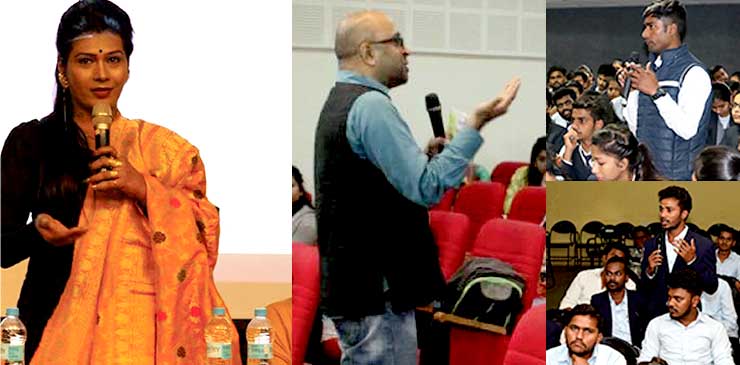
My impressions on the unique SamaBhav Film Festival
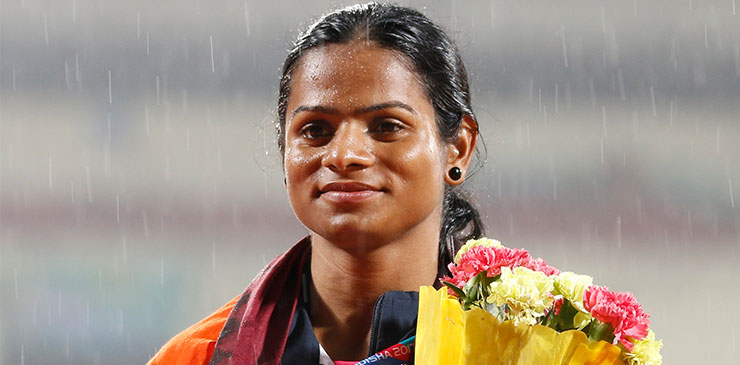
Out and Proud Dutee
Hi Folks! In the newly designed website of MAVA, we are glad to have an interactive blog space for MAVA team, associates, youth leaders from colleges and universities across India… a space for ventilating your thoughts, ideas, experiences, anecdote-sharing and concerns on contemporary gender happenings. The sharing can be on a wide range of gender and sexuality matters that impact us.
On the current gender scenario, the news about 100 m national champion Dutee Chand from Odisha speaking out in May 2019 about same-sex relationship she has been with a woman from her village need to be noted. Threatened and blackmailed by her sister that she would reveal about her relationship, Dutee decided to tell everyone herself.
Being the first Indian openly gay athlete, young Dutee has struggled a lot to achieve in her sport. And now, she is facing social stigma from her family and villagers, who all had earlier admired her for achievements.
Last year, the Supreme Court decriminalised same-sex love by reading down Section 377 of IPC. It was a big win in the fight for sexual rights. But the LGBT community still continues to face various kinds of discrimination and stigma in society - from physical attacks to blackmailing to professional setback.
Dutee is Out and Proud. Her coming out will give courage to countless others. We all should be standing in solidarity with her…
What are your ideas about breaking the gender binaries and of an inclusive, gender-equal society? Please do share, with personal examples.
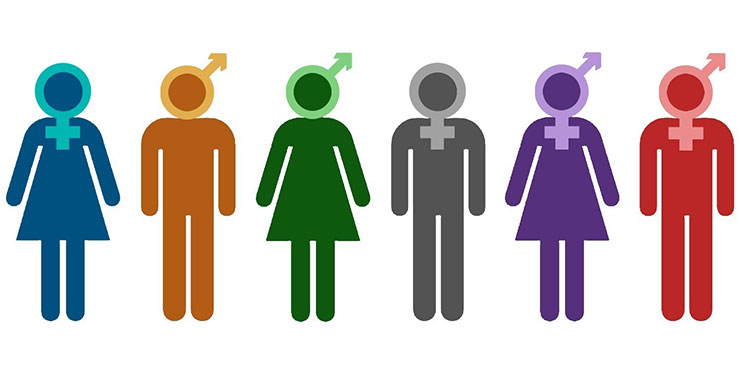
Samabhav
औरंगाबाद, भंडारा, सातारा या सारख्या छोट्या शहरात पहिल्यांदाच 'समभाव' फिरता चित्रपट महोत्सव आयोजित करण्यात आला होता. लिंगभाव, मर्दानगी, लैंगिक विविधता या नवीन विषयाची ओळख करून देणारा हा चित्रपट महोत्सव आकर्षणचा विषय ठरला आणि आता त्या शहरात हि चित्रपट संस्कृती उदयास येऊ लागली आहे.
एकाच चित्रपट महोत्सवात लिंगभावा-आधारित हिंसा, लैंगिकता, मर्दानगी, नातेसंबंधामधील सहमती, लैंगिक विविधता अश्या अनेक विषयावर बिनदिक्कत चर्चा घडून आल्या. लिंगभावावर आधारित होणारी हिंसा या विषयावर फक्त मुली, महिलाच नाही तर मुलगे व पुरुष आपले अनुभव व्यक्त करून या नव्या व्यासपीठावरून आपल्या भावनेला मोकळीकता देत होते. हिजडे, समलिंगी लोक आपल्या समाजजीवनाचा भाग आहेत हे मान्य करू लागले व त्यांच्या वर आधारित अजून सिनेमे दाखविले जावे अशी चर्चा व मागणी करू लागलेत.
या 'समभाव फिरता चित्रपट महोत्सवाचे आयोजन नविन शहरात, अधिकाधिक महाविद्यालय वा शैक्षणिक संस्थेच्या परिसरात करण्यासाठी 'मावा' कटीबद्ध आहे.
Patriarchy Impacts Men too
Good morning. I am happy to be back at the Samabhav film festival, albeit in a different Jain
University campus. I thoroughly enjoyed the 2017 edition. So I would like to begin by
thanking MAVA and Harish Sadani for inviting me again, as well as Vimochana, Jain
University and the British Deputy High Commission for having me here.
Some of you may be aware that in January 2019 the American Psychological Association
released guidelines to help psychologists work with men and boys for the first time ever.
Interestingly, the APA had approved guidelines for working with girls and women way back
in 2007 – that’s a dozen years ago. And it has also in the past developed guidelines for work
with various other groups, such as members of ethnic and linguistic minorities, and
communities identified by age, gender identification and sexuality. But until six months ago
there was no such guide for working with males. This is probably because in psychology
men – especially white males – were historically considered the norm.
Thirteen years in the making, the new Guidelines for Psychological Practice With Boys and
Men draw on more than 40 years of research showing that traditional masculinity is
psychologically harmful and that socializing boys to suppress their emotions causes damage
that echoes both inwardly and outwardly.
The 10 guidelines highlight the fact that males who are socialized to conform to “traditional
masculinity ideology” are often negatively affected in terms of mental and physical health.
While acknowledging that ideas about masculinity vary across cultures, age groups and
ethnicities, the guidelines point to common themes that characterise most forms of
masculinity.
“Though men benefit from patriarchy, they are also impinged upon by patriarchy,” says
Professor Ronald F. Levant, co-editor of the APA volume, “The Psychology of Men and
Masculinities.”
According to Professor Fredric Rabinowitz, one of the lead writers of the new guidelines, the
primary purpose of the guidelines was to help men and boys lead happy, healthy lives. He
points out that men have higher suicide rates and more cardiovascular disease, and that
men also tend to be lonelier as they get older. “We’re trying to help men by expanding their
emotional repertoire, not trying to take away the strengths that men have,” he says.
Research over the years has established that traditional masculinity is, on the whole,
harmful and that men socialized in this way are less likely to engage in healthy behaviours.
For example, a 2011 study found that men with the strongest beliefs about masculinity were
only half as likely as men with more moderate masculine beliefs to get preventive health
care. This masculine reluctance toward self-care apparently extends to psychological help.
According to Rabinowitz, “Because of the way many men have been brought up—to be self-
sufficient and able to take care of themselves—any sense that things aren’t OK needs to be
kept secret.” Hr says, “Part of what happens is that men who keep things to themselves look
outward and see that no one else is sharing any of the conflicts that they feel inside. That
makes them feel isolated. They think they’re alone. They think they’re weak. They think
they’re not OK. They don’t realize that other men are also harbouring private thoughts and
private emotions and private conflicts.”
These private conflicts can have tragic ramifications. Although men report less depression
than women, they complete suicide at far higher rates than women. This is true in the US
and it is true in India (I’ve written about NCRB data on suicide).
According to Ryon McDermott, also a professor of psychology who helped draft the
guidelines, “If we can change men, we can change the world.”
It may appear that consciousness about the limitations, restrictions and pressures placed on
men by traditional concepts of masculinity is a relatively new phenomenon. However, I
know for a fact that it is not.
The first time I wrote about the issue was almost exactly 40 years ago, in May 1979. I was
working with one of the two leading Indian women’s magazines of the time, unfortunately
named “Eve’s Weekly.” All those decades back, long before most of you were born –
possibly when your parents were just about born – we decided to bring out a special edition
on “Men’s Liberation.” And in it I wrote an article headlined, “Growing up male.” I re-read
it last night and I must say it doesn’t read dated at all.
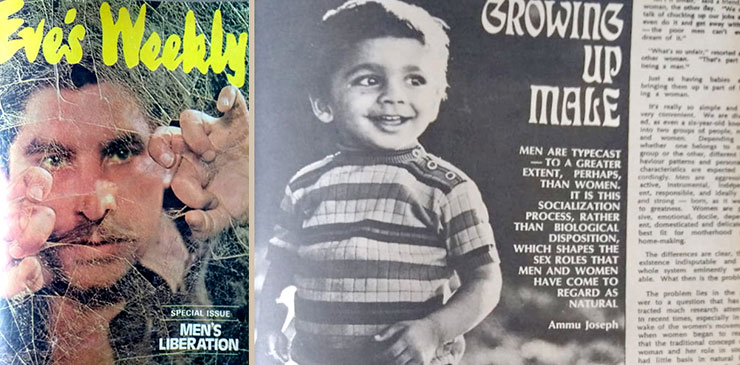
The sad thing is that we have not really moved forward in terms of men and boys
recognising that patriarchal ideas and ideals of masculinity oppress them, just as patriarchal
ideas and ideals of femininity oppress women and girls.
That is why I have been a great admirer and supporter of MAVA ever since I first came
across the organisation and its work many, many years ago in Mumbai – soon after it began
its work, if I’m not mistaken. And that is also why I am happy to be here today at a film
festival that creates time and space for men and boys, as well as everyone else who cares about them, to reflect on what it takes to be a happy, healthy and good human being,
irrespective of sex, gender and other such markers of identity.

Experience at Samabhav film festival
Social changes in communities and beyond is not so easy to bring about. When it comes to conversations about patriarchy, an exclusively female-oriented approach does not acknowledge that men and boys are part of the solution for the myriad challenges we face today. The film festival through a three programme of screening films and initiating conversations showed us an other way to tackle gender gaps.
Culture creates identities for each sex, stereotypes abound in our societies. Such stereotypes separate and can hurt individuals, trapping them in deterministic boxes. It is not the differences that are the issue but it is situations of inequality and dependence that are built up around these differences that becomes an issue.
The only way to make it less of an issue is to bring about change in the people who practice the culture. Cinema as a mass medium is an influential mode to initiate conversations and expose us to sights of pain.
Though far we were as audience from the problem shown in the movies we were still a part of it.
It was indeed a needed experience.
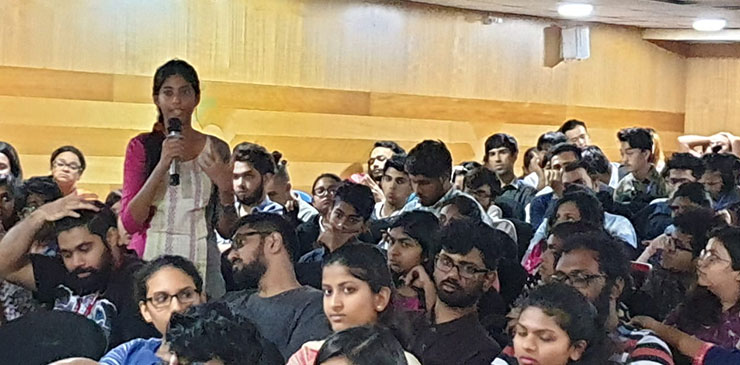
Film Fest Providing Safe Space for youths to ventilate
The 3 day Samabhav Film Festival in Bangalore was one bold move in the field of gender-sensitization. As a student who attended the Fest, I would say it impacted the whole student community. Many students including me were able to speak on all the concepts, which are generally considered “taboo” in the typical Indian society.
After attending the Film Fest on the second day, I personally felt it was a great loss for me to miss the first day. The movie “The World Before Her” gave out a strong message on how women are being made an easy prey not only for physical and sexual violence but also in term of emotional violence through subtle manipulation and brainwashing. The movie was based on two extreme worlds of women.
In both the worlds, the women were made to undergo intense physical training but for two different extreme reasons. One world before her directed her towards preserving culture and religion in a violent way, whenever it is necessary. The other world attracts her towards the epitome of the world in terms of “Beauty”. But, both the women do not know there are different worlds where culture, religion and beauty are diverse. Or, they are in a world where they don’t accept it. The brainwashing is so clear and evident that both the type of women at a point have a change of mind. And, that is the point of their dreams melting into thin air. But, when their dreams are melting away, unfortunately, they were not brought up in a “Frog in the well” way and they resort to marriage as their last resort to survive in this society and as “Happiness”.
This movie brought up a realisation that it’s not only the ancient imagined religions preyed on women, but the modern imagined religions like “Consumerism” and “Capitalism” are continuing to prey on women keeping them in the same vicious cycle-loop as ever. The subsequent movies were about Homosexuality, portraying the love between the same sex people, rather than the “Sex”, that people usually imagine and feel disgusting.
This particularly sparked an unexpectedly open conversation among the students including me. Some of them even courageously declared that they belong to sexual minorities group without the fear of being judged by anyone in the room. And, that I would call was “BRAVE”. If revolution is something creating a courageous change, then this Film Fest is a REVOLUTION already. The final day of the Film Fest started with deeply sensitive testimonies of women all over the world speaking about their real horror which stops with just a nightmare for us. The testimonies rather than sparking conversation, literally choked everyone’s throat with captured tears. And, the whole Film Fest ended with the same spirited conversation from the first day, but this time about a complete overview on movies and their impact in general.
Mr Harish Sadani and Jain University have to be appreciated and thanked profusely for providing the students, the next generation torch bearers such an important and worthy opportunity to learn and become better human beings. The panelists like Ms Priyanka RJ, Pravin Thote and Vinay Chandran also gave us better insights on how we can behave as “HUMANS” with the sexual minorities who are constantly judged, ignored and undergo inhumane treatment. So, all those who were a reason for this Film Fest to happen have one more responsibility.
It is to have more Film Festivals like this and continue educating people to make them become better human beings.
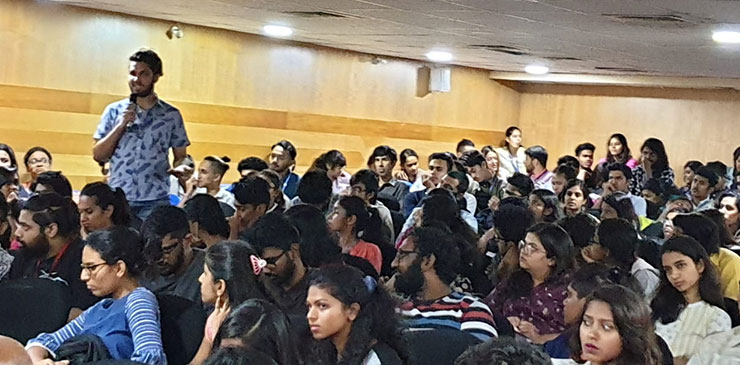
Male Mental Health and Toxic Masculinity Deliberated
My experience with the Samabhav film festival as put forth by MAVA, was a rather pleasant experience, as it brought about awareness in terms of various departments that needed to be addressed, such as male toxicity, consent, rejection, sexual harassment and male mental health, which is often kept under the radar due to the social stigmas of how men need to be independent.
The first day brought about shocking movies and documentaries that shook the entire audience into moments of long brooding. That was needed. Howbeit on the second day when conversations were brought about homosexuality and acknowledging their right to express their sexuality, the discussions did feel extremely polarized, with the majority of the audience feeling as though they had to put into boxes that were labelled "for" or "against". The third and final day however was by the best day for me personally, as Dr. Corinne Kumar from Vimochana was extremely professional, followed with her usage of anecdotes making the seminar excellent.
To conclude this succinct analysis of Samabhav, it was an amazing experience and i do hope they will conduct it next year.













